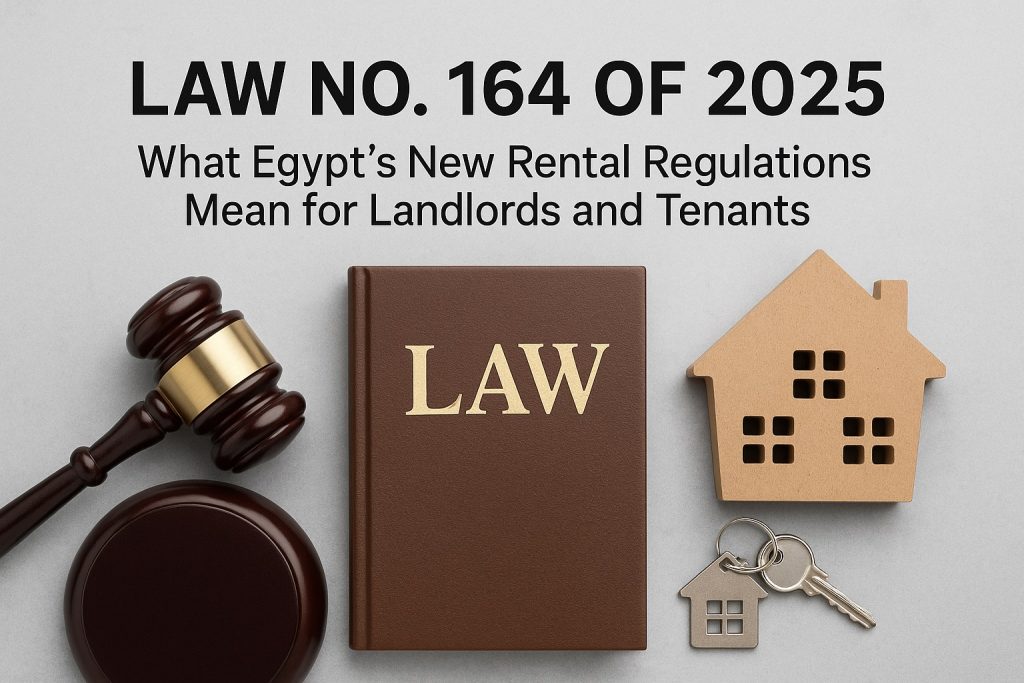
On the 4th of August 2025, President Abdel Fattah El-Sisi approved Law No. 164 of 2025 (the “New Rental Law”). This legislation is considered as one of the most transformative changes to Egypt’s rental framework in decades, tackling challenges deep-rooted in rental laws. The New Rental Law aims to establish a fair balance between safeguarding tenants and protecting landlords’ interests, the New Rental Law aspires to modernize the market, encourage real estate investment, and offer clearer legal guidelines for all.
Egypt’s former rental regulations, particularly Laws No. 49 of 1977 and No. 136 of 1981 (the “Former Rental Laws”), were often criticized for imposing strict rent controls that prevented landlords from adjusting rental rates in order to align with the market conditions and kept properties tied-up in long-term leases. Although said Former Rental Laws originally intended to promote social stability and ensure housing security for tenants, these measures unintentionally deterred property owners from investing in or properly maintaining their buildings seeing as they deemed themselves already at loss due to the law rents they received, while also fueling numerous legal disputes.
The New Rental Law seeks to remedy these issues by introducing market-aligned rents, establishing clear timelines for the transitions to be implemented in rent values, structured eviction procedures, as well as safeguards for affected tenants ensuring no tenant is left without an alternative. This article shall dive into the framework of the New Rental Law, exploring its impact on both tenants and landlords, as well as the practical steps for its enforcement.
The Former Rental Laws
The Former Rental Laws were introduced in the 1970s and 1980s as part of a wider social initiative aimed at providing affordable housing to citizens in urban areas. Key features of said laws included:
- Fixed rents and rent controls: Tenants often paid rents far below market value, with no automatic mechanisms for adjustment.
- Automatic lease renewal: Leases were renewed indefinitely, limiting landlords’ ability to reclaim their properties.
- Tenant protections: Evictions were highly restricted, even in cases of property abandonment or misuse.
While these measures did effectively safeguard the tenants, they, ironically, created an imbalance in the rental market. Landlords had limited financial incentives to maintain properties, as mentioned above, they no longer invested in improvements, nor offer new rental units, which thus resulted in deteriorating housing stock and endless legal disputes.
The New Rental Law
Furthermore, in 2024, following decades of un-remitting disputes concerning rental matters, Egypt’s Supreme Constitutional Court deemed the fixed rents imposed by the Former Rental Laws unconstitutional. The Court argued that such rents should be temporary and subject to periodical review to ensure fairness to property owners and landlords. This ruling paved the way for the government to introduce comprehensive reforms through the New Rental Law.
The New Rental Law was further driven by economic and demographic factors. The rapid urbanization, population growth, and rising housing demand emphasized the need for a rental framework that encourages private investment while safeguarding any vulnerable tenants. The New Rental Law then proceeded to ensure said incentives and safeguards by establishing market-oriented rents and clear procedures for lease termination, it mainly aims to unlock the numerous underutilized real estate assets and promote the construction and maintenance of rental properties which were once neglected.
Adding to the above, the New Rental Law shall apply mainly to:
- Residential units leased under the Former Rental Laws.
- Non-residential units leased by natural persons under the Former Rental Laws.
It is worth noting that the New Rental Law does not apply to any rental agreements concluded after the 30th of January, 1996 ensuring that any lease contracts considered recent, meaning they already follow market practices, remain unaffected.
Transition and Lease-termination Timelines
A key feature of the New Rental Law is the introduction of clearly-defined transition periods for existing leases. These periods allow tenants sufficient time to adjust while providing landlords the ability to reclaim possession of their properties.
- Residential leases: All residential units under the Old Rental Laws will terminate automatically seven (7) years from the 5th of August 2025 (the “Enforcement Date”).
- Non-residential leases: Leases of non-residential properties will terminate automatically five (5) years from the Enforcement Date.
These timelines are designed to provide a gradual phase-out of the old system, preventing sudden displacement while ensuring the eventual application of market-based rents.
Rent Adjustments and Market Alignment
The New Rental Law introduces a structured mechanism for establishing market-aligned rent values:
- Interim Rent: Until rental areas are officially classified, all units will be subject to a uniform monthly rent of EGP 250 (two hundred and fifty Egyptian Pounds).
- Zonal Classification: Each governorate will classify rental areas into three categories:
- Premium;
- Middle-class; and
- Economic zones.
- Adjusted Rent Rates:
- Premium zones: Twenty times (20x) the current legal rent, with a minimum of EGP 1,000/month (one thousand Egyptian Pounds).
- Middle-class zones: Ten times (10x) the current legal rent, with a minimum of EGP 400/month (four hundred Egyptian Pounds).
- Economic zones: Ten times (10x) the current legal rent, with a minimum of EGP 250/month (two hundred and fifty Egyptian Pounds).
- Non-residential units: Five times (5x) the current legal rent.
- Annual Increase: Said adjusted rents will increase by 15% per year to reflect inflation and market trends.
Eviction Procedures
The New Rental Law clearly defines the circumstances under which tenants shall be obligated to vacate the rental properties:
- Upon expiry of the transitional lease period;
- If the property remains unoccupied for over one (1) year without justification; or
- If the tenant owns another suitable housing unit.
Landlords may petition the Court of Summary Matters for immediate eviction in cases where tenants refuse to vacate, providing a faster and more predictable legal process.
Tenant Protections and Alternative Housing
Recognizing the potential social impact that the new framework may result in, the New Rental Law includes measures to safeguard said evicted tenants:
- Eligible tenants may receive alternative housing, either for rent or ownership;
- Original tenants and their spouses are given priority in the allocation of alternative units; and
- A unified application process will comment on the 1st of October, 2025, through an online portal and through local post offices.
Local Implementation and Oversight
The effective implementation of the New Rental Law will depend on local governance. Each governorate is required to establish technical and legal committees tasked with classifying rental areas into premium, middle-class, and economic zones, as explained under “Rent Adjustments and Market Alignment”, with assessments to be completed within three (3) months from the Enforcement Date. The committees’ findings will be published in the Official Gazette and local administrative offices to ensure transparency and accessibility. Meanwhile, the government will oversee compliance, monitor disputes, and facilitate tenant relocation programs to minimize disruption.
In conclusion, the New Rental Law is a transformative reform for Egypt’s rental sector, balancing the interests of landlords, tenants, and the market. It provides landlords with rent flexibility and legal clarity, safeguards tenants with structured lease transitions and housing options, and stimulates the real estate market by unlocking underutilized units and encouraging investment. By phasing out outdated rules of the Former Rental Laws and introducing market-aligned rents, the New Rental Law shall create a fair, modern, and transparent rental system, with its success surely depending on effective implementation and the hand-in-hand cooperation of all the involved parties.




